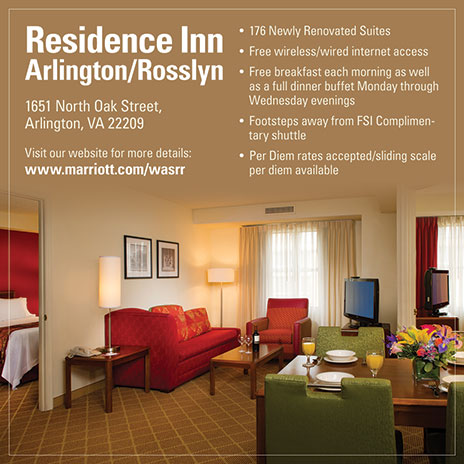A Pioneer in Saudi Arabia
In the Middle East, one female officer found embassy management a greater obstacle than the conservative local culture.
BY ANDREA FARSAKH

In Tunis, after the signing of the Oslo Agreements in September 1993, FSO Andrea Farsakh was the designated embassy contact with the Palestine Liberation Organization. Here she greets Yasser Arafat.
Courtesy of Andrea Farsakh
In December 1978, I found myself back in Dhahran, Saudi Arabia.
Bored with the circumscribed life on a Saudi university campus where my husband taught from 1972 to 1975, I had discovered that the nearby consulate general was offering the Foreign Service written exam in December 1974. I took the test and passed. With the enthusiastic support and encouragement of my husband, I joined the Foreign Service in July 1976.
After a tour in Washington, D.C., I found that there were only a couple of off-cycle job openings: general services officer in Damascus and consular officer in Dhahran. The latter offered job possibilities for my husband and boarding school for our son, as well as schooling at post for our daughter.
There was just one wrinkle: the consul general did not want a female officer. Fortune smiled, however; he was curtailed (nothing to do with me), and the new CG, Ralph Lindstrom, and Ambassador John West enthusiastically welcomed my assignment. But would the Saudis accept me? That was another question.
Would the Saudis Accept Me?
My Arabic-language ability did the trick, neutralizing the negative of my gender with Saudi officialdom. The fact that I was married to a Palestinian-American, had spent time in the region and was familiar with the culture, was of considerable help, as well, easing my relationships with Saudis. I was able to visit just about every prison in the Eastern Province, which were filled with American citizens who worked for ARAMCO and other U.S. companies. Most had been involved in graft, drugs, pornography and, by far the most common “crime” of all, alcohol offenses.
While everyone was hyperaware of Saudi laws against possession and sale of alcohol, the desire for it was unquenchable. One poignant example of the alcohol ban involved the case of a young man in his late teens caught with a bottle of cough medicine bought legally in a Saudi pharmacy—but it contained alcohol! He had the misfortune of being the first U.S. citizen sentenced to be flogged in the Kingdom. One small comfort: the flogging was done in the prison courtyard and not in public. The ambassador was naturally deeply concerned; but nothing could be done, and the sentence was carried out—an unfortunate precedent thereafter regularly imposed on American citizens there.
The prison commanders were always extremely polite and cooperative with me. While I flattered myself that it was my language ability that eased my path, my husband theorized that their courtliness and seeming cooperativeness were only tactics to get rid of me more quickly!
So after crossing the country to be Mrs. Shultz’s control officer, I found that my sole duty was to escort her to her hotel room.
My gender and language skills gave me entrée into the strictly segregated world of Saudi women, which provided an opportunity for me to do political reporting on female life behind the walls. I was encouraged by the consul general to do this, drawing kudos from male colleagues in the Kingdom and in other Persian Gulf countries. I visited homes and female institutions, and called on women who were much less likely than men to speak English.
I developed a friendly relationship with the emir of the Eastern Province, Abd al-Muhsin Bin Jiluwi, whose father had helped King Abd al-Aziz conquer Riyadh in the early 20th century. The emir spoke no English, but because I was able to converse with him, he always received me most graciously and even invited me to lunch with him a few times. Our cordial relationship motivated him to arrange for me to call on his wife, which I did. The emir liked to talk about space travel! I also met with the emir of Al Hasa Province a few times and lunched with him. One time we were regaled with Bedouin poetry by an authentic Bedouin—I did not understand a word, but neither did my Saudi colleague from the consulate.
Management’s View of Propriety
Meanwhile, my husband had found a job with ARAMCO and did not want to move when my assignment was over in summer 1981. So to stay fairly close to Dhahran I bid on a new position: political officer in Abu Dhabi. Again my gender became an issue—the ambassador and deputy chief of mission did not want a female officer. And again, luck smiled on me. The embassy, then in Jeddah, asked me to bid, and I was assigned as an external relations political officer there. My portfolio signified that most of my business was with the Foreign Ministry. The Saudis who worked there had served abroad and were cosmopolitan in their outlook, so I was always treated with great courtesy.
I was the only female political officer in Jeddah, but was fortunate to have a most supportive and wonderful boss, David Newton, and a great deputy chief of mission, Jim Placke. And all of my international colleagues were most welcoming. I was, of course, the only one in the group who was not allowed to drive, so after our monthly evening meetings they always made sure my transportation needs were met without having to call—and wait for—an embassy driver.
Problems sometimes arose with embassy management, all the same. On one occasion during my second year, I was visiting my husband in Dhahran when the political counselor asked me to return to Jeddah because Secretary of State George Shultz and Ambassador Philip Habib were coming to see the king to discuss the civil war in Lebanon. I was to be a “site officer” (a sort of visit monitor in the royal palace). However, when I got back to Jeddah, I was informed that embassy management did not think it proper for a female officer to be in the palace. So after crossing the country to be Mrs. Shultz’s control officer, I found that my sole duty was to escort her to her hotel room.
On another occasion, as control officer for a congressional delegation in Riyadh, I was instructed to arrange a luncheon at the Equestrian Club. I dealt directly with the prince in charge of the visit, who emphasized that while spouses were not invited, I was definitely on the guest list. A couple of hours before the event, however, I was advised that I was not to attend because, once again, embassy management deemed it improper. A male officer went in my place. I briefly considered protesting, but the event was imminent, and I felt that creating an incident would not benefit anyone.
Given all the restrictions on women in the Kingdom, and aware of my very unusual—and pioneering—position, I believed that I had mostly succeeded in doing the job to which I had been assigned. The support that I received from the ambassador, the DCM in my first year, my boss and most of my colleagues made up for the occasional slights that occurred.
A Seat at the Table
My tour in Jeddah had a pleasant conclusion in the summer of 1983. Ambassador Richard Murphy’s tour was ending, and the Saudi Foreign Ministry was giving him a farewell dinner. The deputy chief of protocol, with whom I had dealt frequently, made sure that all female officers in the embassy (economic, budget & fiscal and personnel, as well as myself) received invitations and insisted that we attend. So on my last night in Jeddah, I went to the ambassador’s dinner, and then to the airport. My onward assignment was as a political officer in Abu Dhabi, where there was a new ambassador and DCM.
Abu Dhabi seemed wildly free after Saudi Arabia. I could call on and attend meetings with virtually any official—with one exception. I was informed that UAE President Shaykh Zayed Al-Nahayyan loved to tell off-color jokes, so my presence in his company—and comprehension of Arabic—would be embarrassing! Ambassador Quincey Lumsden and DCM David Ransom were 100-percent supportive of my work.
My gender and language skills gave me entree into the strictly segregated world of Saudi women.
The economic officer and I traveled to all the emirates, called on rulers and key people, drank camel’s milk and had a great time. Iranair had two flights a week to Dubai, and with the bloody Iran-Iraq war in full swing, the first stop for many Iranians was the U.S. consulate general. Many Iranians had relatives in the United States, and parents were fearful of their sons being drafted into fighting in a brutal war. The junior consular officer there, Michael Matera, and I decided to question successful visa applicants to try to find out what was happening inside Iran, as the department at that time had very little information. The Bureau of Near Eastern Affairs was so pleased with our initiative that they sent a cable with the questions we should ask. We sent in a series of reports that were very gratefully received.
As the years passed, and increasing numbers of female officers joined the Service, the problems that I had experienced diminished. However, one issue still dogged me. I had always wanted to work on Israel-Palestine issues, so at one point I bid on a political position in Amman. I later heard from a friend that the DCM there declared in a staff meeting that he did not want a woman with a Palestinian husband in the political section.
In 1992, I was assigned to Tunis as political counselor. At that time, U.S. officials were not permitted to have any substantive contact with Palestine Liberation Organization officials then based in Tunis. With the signing of the Oslo Agreements in September 1993, everything changed: Embassy Tunis was instructed to initiate significant relationships with key officials, including PLO leader Yasser Arafat. This was the pinnacle of my FS career. My deep familiarity with the issues and Arabic-language capability made me the designated principal embassy contact with the PLO. While Oslo ultimately was a failure, at the time the agreements seemed full of promise. I helped arrange and participated in the first meeting between a U.S. Secretary of State—Warren Christopher—and Yasser Arafat.
On Reflection
During my career I had the good fortune to serve in the most conservative Middle Eastern country for women, Saudi Arabia, and in the most progressive one, Tunisia, and I have witnessed significant change.
By now, every country in the Arab world except Saudi Arabia has had a female U.S. ambassador. Female officers are accepted everywhere, and that is a real victory for women in the U.S. Foreign Service.
In reflecting on my experience, two thoughts come to mind. First, I would very much like to see a career woman—with Arabic ability—nominated as U.S. ambassador to Saudi Arabia. At this time of great ferment in the Arab and Islamic world, such a move would serve as a beacon to all progressives in the region.
Second, as my career experience illustrates, language capability is extremely important, indeed critical. Without this, the officer walks in a bubble, restricted to English-speaking elites and cut off from the society in which she is trying to function.
Read More...
- Women in the Foreign Service, Frequently Asked Questions (The U.S. Department of State Office of the Historian)
- Female diplomats share secrets by Nahal Toosi (Politico, September 3, 2014)
- An American Girl in Riyadh by Tara Foley, (Dipnote blog)





